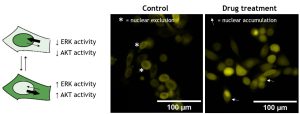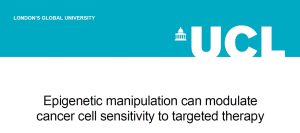Year 3 research project at the Crick
From November 2021 to May 2022 I had the opportunity to join Dr Erik Sahai’s Tumour Cell Biology laboratory at the Francis Crick Institute. As part of my third year of studies in Applied Medical Sciences I was required to carry out a research project in a lab at UCL or at an affiliated institute. Having just finished a great summer internship at the Crick, I reached out to Dr Sahai, who kindly offered me a research project co-supervised by two excellent postdocs, Dr Alix Le Marois and Dr Colin Ratcliffe.
My work sought investigate the effects of combined epigenetic and targeted cancer therapies in in vitro models of lung and breast cancer. It was a perfect occasion to gain insight in cell biology research, as well as practical experience in cell culture, fluorescence microscopy, image analysis and more.
About my project
Cancer is a leading cause of mortality worldwide, and despite major improvements achieved with targeted therapeutics, the development of drug resistance remains a key obstacle to successful cancer therapy. Epigenetic manipulation has emerged as a potential strategy to enhance the efficacy of other anticancer drugs. By shaping the accessibility of chromatin domains, epigenetic modifying agents may broadly modulate cell state, and thus cell response to targeted kinase inhibition.
To address this hypothesis I investigated the effects of a selected panel of epigenetic modifiers in combination with clinically relevant targeted therapies in cell line models of non-small cell lung cancer and triple-negative breast cancer.
My first aim was to investigate the effect of short-term combinatorial drug treatment on cell viability.
Secondly, I exploited fluorescent biosensors that report on kinase activity to track signalling dynamics in response to therapy. In particular, I used two kinase translocation reporters (KTRs) for quantifying ERK and AKT activity in biosensor-expressing lung and breast cancer cells, respectively. KTRs translate kinase activity into a nucleo-cytoplasmic shuttling event, so the distribution of fluorescence across the two compartments can be computed to determine kinase signalling levels at single-cell resolution (see figure below).
Additionally, I explored the effects of drug treatment on the expression of a marker linked to loss of long-term proliferative capacity – histone H1.0. This was carried out by immunofluorescence staining and imaging on a confocal microscope.

Representative images of kinase translocation reporter (KTR) expressing cells.
Writing my Year 3 dissertation
The assessment of my Year 3 research project entailed writing a dissertation which included introduction, methods, results, and discussion. This was my first time summarising my work in a research paper format, and I struggled most with writing the discussion. It was quite difficult for me to compare and suggest why various drug combinations exerted different effects on cell viability and kinase signalling in multiple cell types, and speculate why the results obtained resembled or differed from other findings in the literature. For this I greatly benefitted from talking with my supervisors and drawing on their feedback. Although writing the dissertation was a challenging part of the project, in the end it was truly rewarding to see all my work come together.

Dissertation heading.
An incredible learning opportunity
As I think back, it’s difficult to pick out the many things I’ve learnt throughout this project. One of the practical aspects I hope I won’t forget is the importance of carrying out pilot experiments with their accompanying data analysis. Due to time constraints, one of the mistakes I made was to collect all my imaging data without attempting a pilot analysis beforehand. Doing so would have taught me the file name parameters required by the image analysis software CellProfiler, so I wouldn’t have ended up manually reorganising and renaming hundreds of files!
Beside this trivial example, this research opportunity in Dr Sahai’s lab has valuably shown me that I enjoy wet-lab work, but also that being able to code in programs such as MatLab, Python or R is becoming an evermore helpful skill. Hence looking ahead, I’m keen on gaining some computational research experience during my upcoming integrated master’s (Year 4) research project.